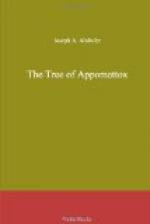It is likely also that the sergeant had a perception of it, though not as sharp and clear as Dick’s.
“When the war is over and the soldiers all go back, that is them that’s livin’,” he said, “it won’t be them that fought that’ll keep the grudge. It’s the women who’ve lost their own that’ll hate longest.”
“I think what you say is true, Whitley,” said Dick, “but let’s not talk about it any more. It hurts.”
“Me too,” said the sergeant. “But don’t you like this country that we’re ridin’ through, Mr. Mason?”
“Yes, it’s fine, but most of it has been cropped too hard. I remember reading somewhere that George Washington himself said, away back in the last century, that slave labor, so careless and reckless, was ruining the soil of Virginia.”
“Likely that’s true, sir, but it won’t have much chance to keep on ruinin’ it. Wouldn’t you say, sir, that was a Johnny on his horse up there?”
“I can soon tell you,” said Dick, unslinging his glasses.
On their right was a hill towering above the rest. The slopes were wooded densely, but the crest was quite bare. Upon it sat a solitary figure on horseback, evidently watching the marching column.
Dick put his glasses to his eyes. The hill and the lone sentinel enlarged suddenly and came nearer. The pulses in his temples beat hard. Although he could not see the watcher’s face clearly, because he too was using glasses, he knew him instantly. He would have known that heroic figure and the set of the shoulders and head anywhere. He felt astonishment at first, but it passed quickly. It was likely that they should meet again some time or other, since the field of battle had narrowed so much.
Sergeant Whitley, who invariably saw everything, had seen Dick’s slight start.
“Someone you know, sir?” he asked.
“Yes, sergeant. It’s my cousin, Harry Kenton. You’ve heard me talk of him often. A finer and braver and stronger fellow never lived. He’s using glasses too and I’ve no doubt he’s recognized me.”
Dick suddenly waved his glasses aloft, and Harry Kenton replied in like manner.
“He sees and knows me!” cried Dick.
But the sergeant was very sober. He foresaw that these youths, bound by such ties of blood and affection, might come into battle against each other. The same thought was in Dick’s mind, despite his pleasure at the distant view of Harry.
“We exchanged shots in the Manassas campaign,” said Dick. “We were sheltered and we didn’t know each other until several bullets had passed.”
“Three more horsemen have joined him,” said the sergeant.
“Those are his friends,” said Dick, who had put the glasses back to his eyes. “Look how they stand out against the sun!”
The four horsemen in a row, at equal distances from one another, were enlarged against a brilliant background of red and gold. Their attitude was impressive, as they sat there, unmoving, like statues cut in stone. They were in truth Harry and Dalton, St. Clair and Happy Tom, and farther on the Invincibles were marching, the two colonels at their head, to the Valley of Virginia to reinforce Early, and to make headway, if possible, against Sheridan.




